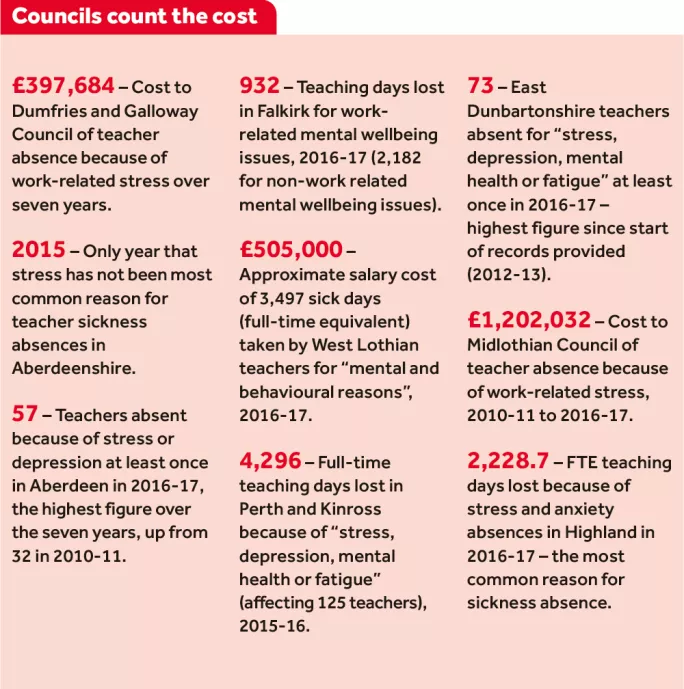Mental health issues cause rise in teacher sick days

An investigation by Tes Scotland has revealed that mental health problems are causing teacher absences to rise across Scotland and are often the most common reason for teachers being too ill to work.
Even small councils can rack up bills of more than £1 million to provide cover over a few years, and there are calls for more pre-emptive support for teachers.
The picture is not uniform, however, with absences reducing in some areas, which commentators say may be a result of growing awareness about mental health.
Data was obtained from 17 councils, using Freedom of Information legislation, with some responses suggesting that mental health problems were increasingly common.
In West Lothian, sick days taken by teachers for “mental and behavioural” reasons peaked at 3,497 in 2016-17 (data since 2010-11 was requested from councils), the most common reason for sickness absence, accounting for a third of all teacher sick days. In Perth and Kinross, 4,296 full-time teaching days were lost due to “stress, depression, mental health or fatigue” in 2015-16 (affecting 125 teachers) - the highest annual figure and far higher than any other sickness category.
Substantial impact
The financial impact could be substantial: during the seven-year period, the cost to Midlothian Council - which has only six mainstream secondary schools - of teacher absence because of work-related stress was more than £1.2 million.
However, the 91 separate absences of Falkirk teachers as a result of “mental wellbeing” problems was the lowest over the seven years, although still amounting to 3,114 days.
In East Ayrshire, the 2,068 days taken by teachers in 2016-17 as a result of stress represented a three-year low. Recent figures from the Improvement Service, a local authority organisation, suggested that teacher absences in Scotland had fallen slightly in recent years and that teachers were far less likely than other public-service workers to be off sick.

Euan Duncan, a guidance teacher and former president of the Scottish Secondary Teachers’ Association, who helped devise the questions the investigation put to councils, said some “more enlightened” local authorities were taking pre-emptive action to improve mental health by, for example, surveying teachers’ views anonymously. Self-referrals to support services were also becoming more common, he said, reducing the chances of teachers feeling stigmatised.
But Mr Duncan added: “Teachers are terribly proud and like to think they’re bullet-proof. Outside the classroom, they are still often reluctant to open up and show what they think might be seen as weakness.”
The falling number of sick days in some areas could be down to National 5s and new Highers starting to bed in, said Mr Duncan, but he fears another spike in mental health problems with upcoming changes to National 4 and the fallout from removing unit assessments.
And the fundamental problem that teachers were being “asked to do more and more as pay has stagnated” had not gone away, he added.
Jim Thewliss, general secretary of School Leaders Scotland, said that, while absence because of mental ill health indicated “increasing demands” on teachers, the system was getting better at recognising warning signs. He added that while there “should be more support”, councils were becoming more “proactive in encouraging employees to access support”.
Billy Watson, chief executive of the Scottish Association for Mental Health (SAMH), said the increasing absences related to mental health might be a positive sign that more teachers are asking for help, because there is now less stigma and “a more open approach to mental health and wellbeing”.
He encouraged teachers to “open up” to employers, adding: “Employers taking proactive steps to create a more open and supportive culture should, over time, see staff become more confident to talk to managers about their mental health.”
A Scottish government spokesman said that its new mental health strategy was attempting to ensure that “mental health has parity of esteem with physical health”.
He added: “We are committed to reducing teacher workload and are taking action, working with councils and the unions. Continued engagement with the profession will play a critical role in making this happen.”
The spokesman also said that mental health first-aid training was being rolled out by Education Scotland and NHS Health Scotland.
You need a Tes subscription to read this article
Subscribe now to read this article and get other subscriber-only content:
- Unlimited access to all Tes magazine content
- Exclusive subscriber-only stories
- Award-winning email newsletters
Already a subscriber? Log in
You need a subscription to read this article
Subscribe now to read this article and get other subscriber-only content, including:
- Unlimited access to all Tes magazine content
- Exclusive subscriber-only stories
- Award-winning email newsletters